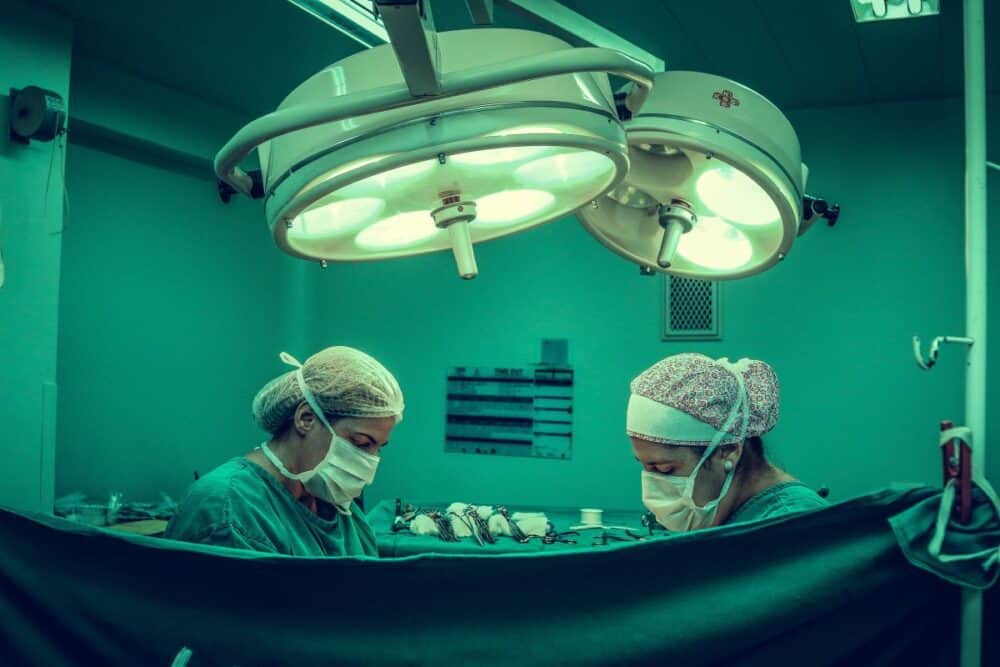I am „Rodica” and I have a sick sister, who has been on dialysis for two years. She’s on the waiting list for a kidney transplant and „I want to buy a kidney for her”. This is how I prepare my entry into the transplant black market in Romania.
I take the long list – 50 kidney ads only, and 30 with liver or lung offers, all posted on very well known ad sites, and I start calling.
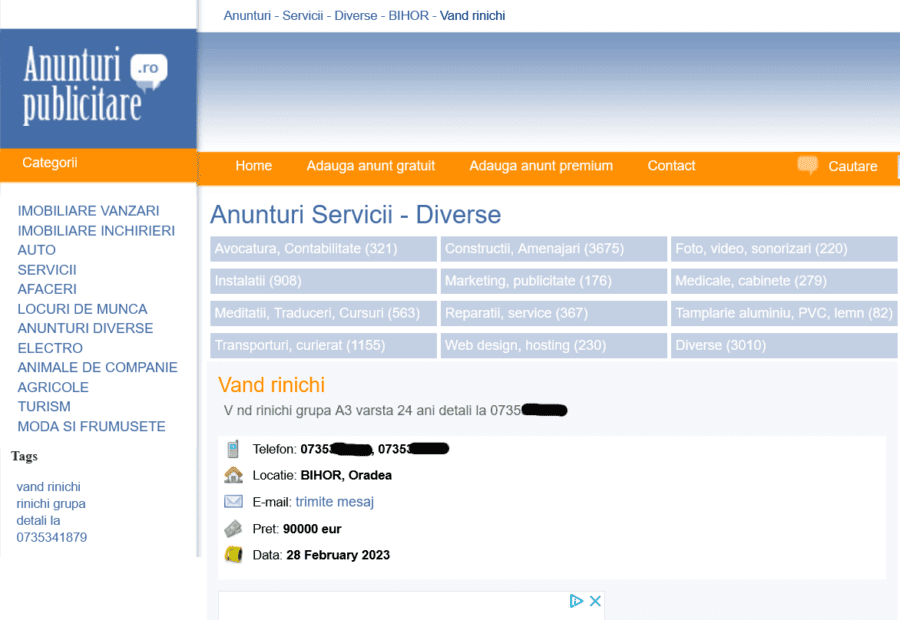
„Kidneys for sale, group A3, age 24, price 90,000 euros, February 28, 2023„, says the ad of a young man from Oradea, the first who answers me.
He is determined to sell, he has „a family problem” to deal with and he needs the money, he won’t change his mind.
He knows that medical tests need to be done, he agrees to go to where the doctor who takes care of my sister is, if necessary, and he is willing to cover the travel costs from the amount of 90,000 euros.
He also tells me to ask the doctor if it is a problem that he is RH negative and if my sister’s body accepts it. And if I want to be sure that he doesn’t change his mind, after he does the tests and it turns out that he’s compatible, we can go to the notary, and make a contract, to put in on an official paper that he won’t change his mind. I ask him if he knows how this procedure works.
„Of course”, he replies, „my cousins did it too and it went well”. I put the phone down and it remains that I will discuss with my „sister”.
„We agree on the price, it’s not nailed down”
A kidney from the following ad looks much cheaper:
„I donate 1 kidney. Location: BUCHAREST, Price: 15000 ron – Date: 19 February 2023„.
I call and a woman’s voice answers. When I tell her what my intentions are, she says she can’t talk at the moment, but she will call back. In an hour or two, she calls me back. He confirms that yes, she wants to sell a kidney. She is 43, blood type A2 and from Bucharest.
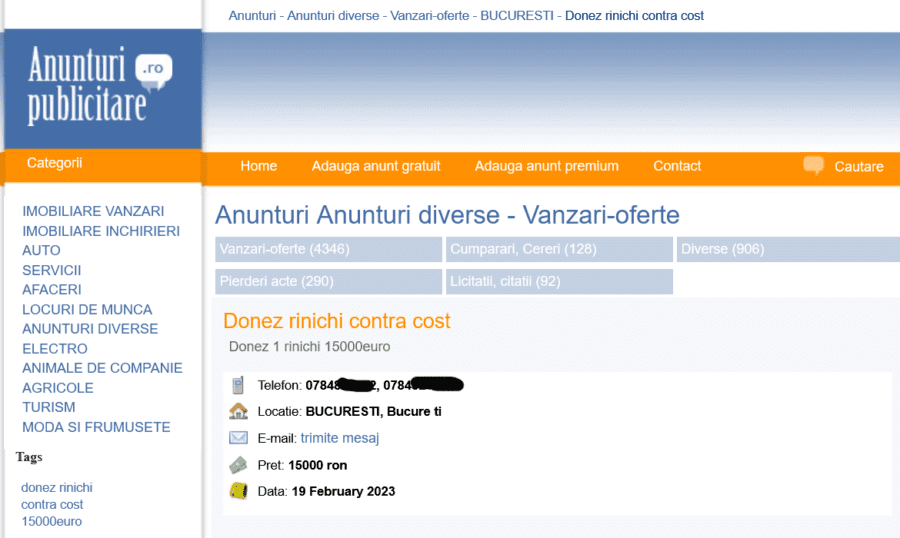
I ask her if she knows where we could do the procedure, because „my sister” is not from Bucharest, and if she knows that these surgeries are successful. She heard that they succeed, especially in Bucharest, where there are good doctors, the best doctors in the whole country.
I ask for details and the woman starts stuttering, it seems that she doesn’t want to come to Cluj. A man’s voice is heard from the background. Takes over the phone and continue talking to me.
„I’m the husband, talk to me, I see you don’t understand each other. If the sister is in Cluj, we can also come there”.
He knows that usually the patient calls his doctor and the doctor tells him what to do. „The girl is coming to Cluj”, if I pay her accomodation, „about four days”, and „if it’s compatible we’ll agree on the price.”
Prices vary from 15,000 euros to 200,000 euros a kidney
The next person I talk to is a 43-year-old man from Dolj. He urgently „donates” a Group A2 positive kidney for 15,000 euros. I ask him if his family agrees. He tells me – in a nervous tone – that he is 43 years old, no longer depends on his parents and is not married, no one cares, what he does is his business.
He heard that analyzes are done before and if it is compatible we make the deal. He knows he’ll be fine with a kidney. Why is he doing this?
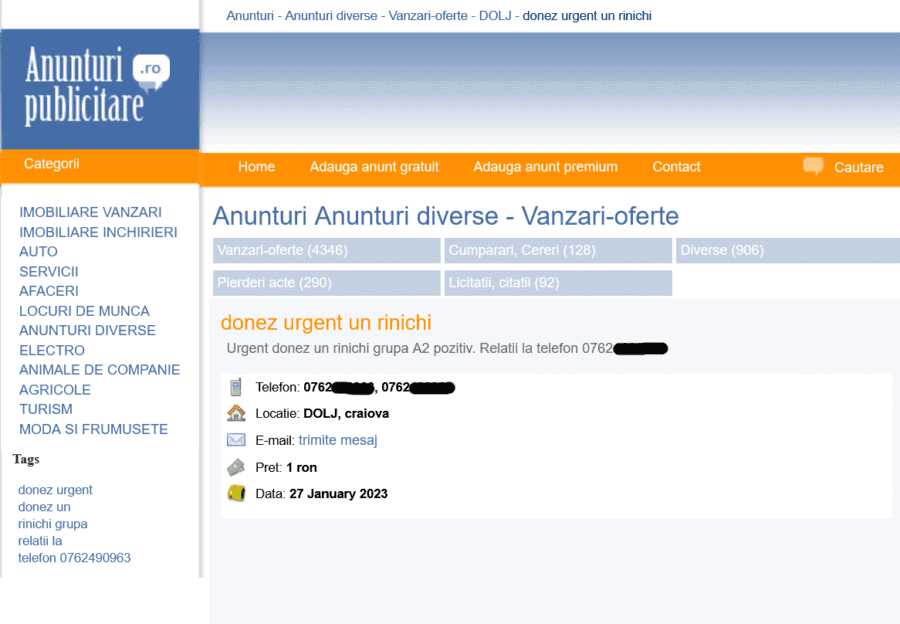
„Because of the poverty in Romania, madam, haven’t you heard that it’s poverty?”
Ads run across multiple pages. Apparently, you can buy just about anything you want. Prices vary from 15,000 euros to 200,000 euros a kidney. Although some start with the word „donate”, sometimes followed by „a person in distress”, they automatically include the price for the organs for sale.
From discussions with people who intend to sell their organs, the following possible route emerges: the patient in need of a transplant, if he/she finds a „donor”, notifies the doctor, which recommends a set of tests to see if they are compatible.
If there is a match, the parties complete the transaction. Some of them also mention a notarial declaration in which they say they are related with the patient and do not change their minds.
The phenomen broke out in the 90s, years of chaos and poverty. It continued in the first years after 2000. A peak of transplants performed in Romania existed in 2013 and another in 2016, but they cannot be associated with such a practice.
Although the sale and purchase of human organs is prohibited by law and punishable with imprisonment, these offers were present throughout the years to this day.
The most recent announcement we found is dated 27 March 2023. This is precisely what surprises the experts we are talking to for this article.
Read also: 3 of the biggest lies about insects based food in European Union
What the law says, what the police do
„Publishing or mediating announcements regarding the donation of organs, tissues or cells of human origin, donation that would be carried out in order to obtain material benefits for oneself or for another, constitutes a crime and is punishable by imprisonment from 6 months to 3 years or with a fine” says the Law 95 of 2006.
Taking or transplanting organs, tissues or cells of human origin from living donors, without consent given under the law, constitutes a crime and is punishable by imprisonment from 2 to 7 years and the prohibition of certain rights.
I asked the Cluj-Napoca Police under what conditions the cases exposed through the advertisements are followed up, and I was told that there is currently no case under investigation.
But if they detect ads of this kind, they will report it and start the investigations , „the facts being prohibited and criminalized by law”.
How to prepare a transplant. The ethics commission and its dilemmas
The Clinical Institute of Urology and Renal Transplantation (ICUTR) in Cluj was, in the past years, the subject of a public scandal that had the doctor Mihai Lucan at the center. Accused of embezzling the Institute and for preferential treatment of a kidney transplant, his case has been in the public eye for several years, and the trial is ongoing.
This event drew attention to the problems in the field and led to the adoption of a series of measures by which transplantation in Romania would be more rigorously controlled. This was imposed by our vulnerable reality, but also by European directives.
For cases with a living donor, an Ethics Commission is established, that analyzes each case before making a decision on donation.
These commissions are established by a ministerial order and are made up of a doctor with bioethics skills – usually from the College of doctors, a psychologist and another MD who is not involved in the act of transplantation.
The current interim medical director of the Cluj Institute, doctor Gheorghiță Iacob, a member of this commission, explained to PRESShub how the procedures are in the case of living donors.
„A man comes to the commission and tells you a story. What do you do? Do you believe him? However, you should grant him the presumption of honesty.
But if you are not convinced, you have the right to be suspicious! They swear they are related, that they do it out of a desire to help. And then we resort to a social survey. If the potential donor has nothing, lives in poverty, how can you believe that he cares about the suffering of another and wants to give him a kidney for free?„
The social investigation is carried out either by the psychologist from the Ethics Commission, or by the town hall where the donor lives.
„We are very restrictive and if they are not related, proven, up to fourth cousins, we do not accept. We do not encourage donation from living people. We have statistical evidence to believe that it would be sufficient to support organ harvesting from the deceased (brain dead — editor’s note) with family consent.”
Dr. Gheorghiță Iacob
The Ethics Commission aims, first of all, for the donor to be informed, „to understand what it means to give up a kidney, because even if you remove a tooth, it can have negative consequences.”
Then, it looks to see if the donor is not forced to donate his organ and that he does so without having any material claim from the reciver.
„However,” continues doctor Iacob, „I am not the police, I cannot control the phenomenon in depth, I do not have the necessary powers and tools. You can be a family member and be constrained. The law does not differentiate, it admits that family members can be disinterested donors, although they may not be.
How do we know that the husband does not force the wife or if a poorer relative is not obliged by circumstances to do what the other family members say?”.
There was also a case in which a prisoner notarized that he voluntarily donated a kidney to his guard. In the roma world, adds doctor Iacob, it is even more complicated because „they have their own world, with different rules”.
„It is complicated to prove how things really are when a man comes and says that he is donating a kidney to a woman because she is his concubine. What are you doing? How do you check this and decide? We take the social investigation as a benchmark, because even in the case of a refusal, we have to argue why we reject the donation. You realize that we have four people in front of the commission, and the patient waiting for a kidney has every interest in receiving it!”.
Dr. Gheorghiță Iacob
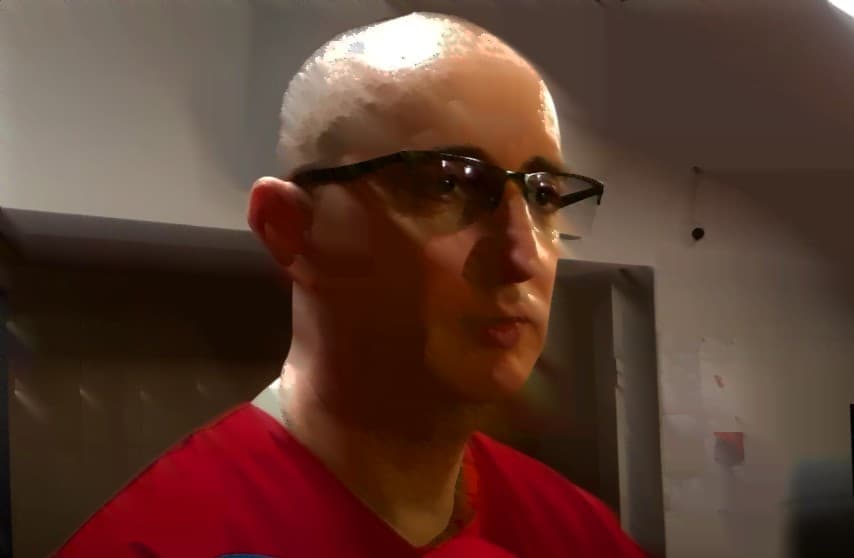
If the patient who should receive the kidney is not satisfied with the commission’s decision, he can file an appeal.
„We have an internal procedure which defines the vulnerabilities of the donor”, states the doctor from Cluj, „procedure necessary to substantiate a decision. We consider the profile of the donor and try to see if they approach the reciver, if they have something in common.
There was a time when they came with the same texts, they had a learned poem. We immediately realized that they were understood”.
„Until 2017, they came with a notarized declaration that they are relatives and that they have no material claims for the organs they donate. But how does the notary know that this is so? Or how do we, the doctors, know that it is so?”, asks Gheorghița Iacob, the interim medical director of the Institute of Urology and Renal Transplantation in Cluj and a member of the Ethics Committee.
Statistics show that in Romania, there are only 5 transplants per million inhabitants, while in Spain there are 30-40 per million inhabitants, and in Hungary, 10-15 per million inhabitants.
„By now,” says the medical director of the ICUTR, „we could triple the number of transplants from the deceased. But this requires first identifying the deceased donor and an extra effort to achieve the transplant.
Know that the families of the deceased are not the problem, there are quite a lot of people who want the organs of their dying loved ones to help others survive, but the transplant effort is an additional one. And from here begins another discussion about how many trained doctors we have, what equipment and how the transplant activity is organized.”
The vision of Romania. What to do
In summary, doctor Gheorghița Iacob believes that there are three steps that should be worked on in order for the transplant situation in Romania to evolve: identifying the deceased donor, encouraging the transplant, the actual activity – and the Ministry of Health finances the procedure, there it must be decided – and only then to encourage donation from living people.
„We personally use every opportunity to do transplants. At the same time, we are very careful not to lose any paid donor because any situation that becomes public does a lot of harm to the transplant situation.”
Regarding the actual organization of the transplant activity, director Iacob says: „Here you start to think and ask yourself, what is the vision of transplantation in Romania. At the moment, we have a legal framework that works. But, there is the following situation: we have patients who require transplantation, but there is no transplantation specialization.
This way, we cannot establish beds, transplant wards. We operate as a urology and kidney transplant department.
In this case, the doctors, and our collective has 6 urological surgeons who can do transplants, they are hired and have to be paid for their work as urologists, per ward.
If they go into transplant operations that take 4-5-6 hours, they can no longer do the work for which we are paid by the state.
I can wake up at the end of the month that I’ve had a transplant, but we don’t get our salaries!”.
Romania’s vision regarding transplantation, believes Gheorghița Iacob, should be oriented towards successful models in Europe, Spain’s being one of the best, and borrow it from there.
„Or,” adds the ironic doctor, „we can also take the Iranian model, where the state pays an amount for the donor, and everything is done officially, in full view. But I don’t believe in encouraging materially enhanced donors.
Rather subsidized in medical services. For example, those who donate one or more organs may receive free medical services or other health compensation. But not material rewards, because then you start a dangerous practice.”
Dr. Gheorghiță Iacob
Who donates vs who exploits. A psycho-social expertise
In the opinion of psychiatrist Gabriel Diaconu, first of all, a distinction must be made between a potential live organ donor and a person who conditions the act – deeply humanitarian – on a certain amount of money.
Then, he says, we have any number of reasons why a person would engage in such behavior:
- Financial restrictions.
- An impending obstacle where, between the need for money and the available resource of money, a seemingly insurmountable gap appears.
- The desire to get out of one’s own social orbit (less often) for purely entrepreneurial reasons.
Of course, and perhaps, rationally, the root cause of behavior is much more diverse, but it can – ultimately – be narrowed down to one of the three mentioned.
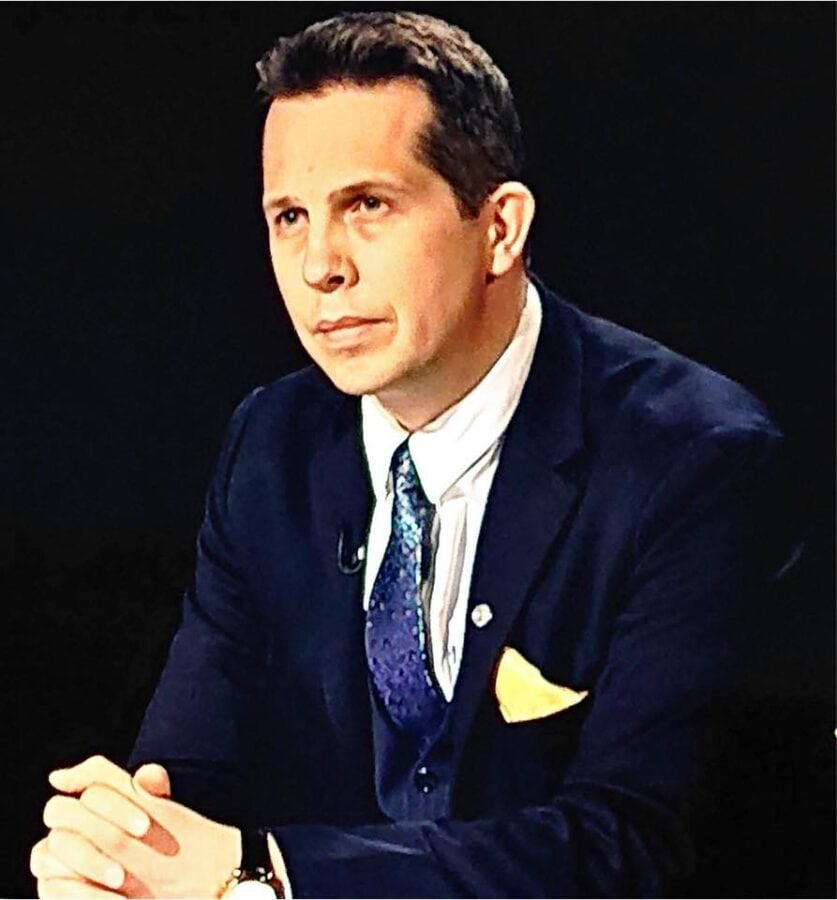
Another aspect has to do with the sporadic nature of financing, in other words, is it a „seller” property vs. the systematic, organized nature, but then we are talking about organ trafficking, in which an intermediary intervenes, an organ „hunter” who makes the connection between potential beneficiaries and potential donors.
In this second case, of the intermediary, the primary motivation is profit.
A good classification of reasons is mandatory, because from there the psychological features of the two categories begin to be distinguished: the „sporadic” vs. the „systematic” one.
Analyzing the ads, psychiatrist Gabriel Diaconu distinguishes the following characteristics.
The sporadic seller is generally a male between the ages of 18 and 40, medium level of education (10 – 12 years of school, possibly high school), with a minimum level of digital literacy, in good health, medium/high levels of social openness , agreeableness, but also neuroticism, average or above average intelligence, impulsiveness, in a relative or absolute, social immobility, willing to act at risk by evading the law.
The systematic seller is generally a man between the ages of 25-55, medium to high level of training (baccalaureate, college), mercantile spirit, possibly even medical studies (completed or not), masters the sampling algorithm, identification of beneficiaries, may have a foundation or an NGO, is familiar with legislation, but also with vulnerabilities in legislation, good frustration tolerance, impulsivity, medium to high levels of neuroticism, medium – high reward dependence, works in „occupational niche”, good manipulator , elements of sociopathy, pragmatism (borderline, cynicism).
Follow PressHUB on Google News !


